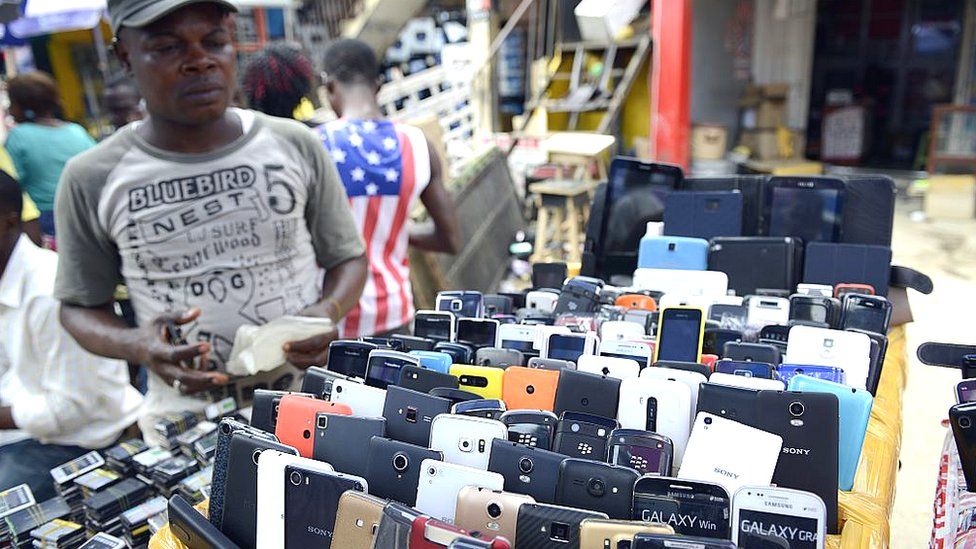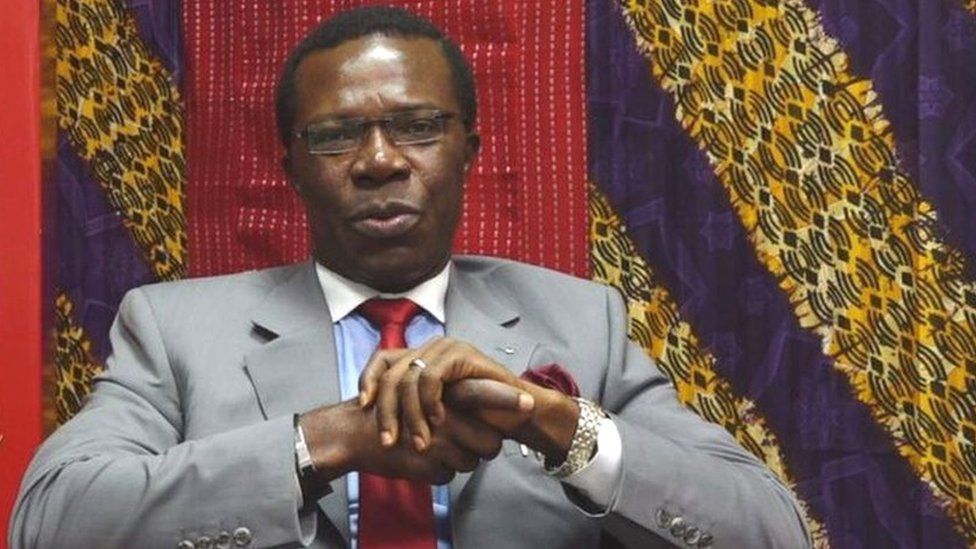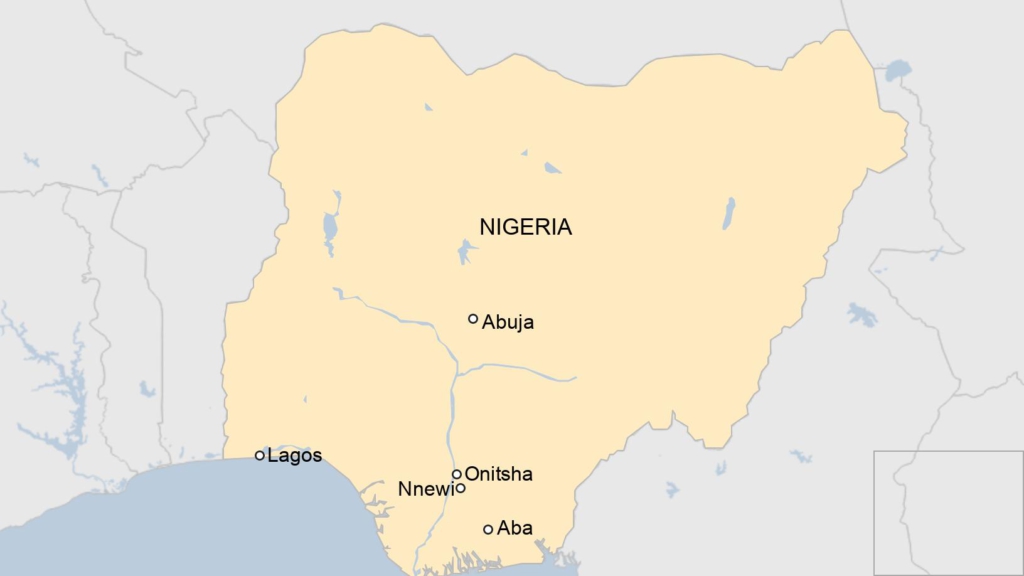Nigeria's Igbo community have a reputation for being highly successful businessmen - partly thanks to a community-run apprentice scheme that emerged from the ruins of war, writes the BBC's Chiagozie Nwonwu in Lagos.
A smiling Onyeka Orie, 28, looks the picture of happiness in his mobile phone accessories shop at the sprawling Computer Village in Nigeria's main city, Lagos.
The shop and everything in it had been given to him by his former boss after Mr Orie worked for him without payment for several years, learning the trade.
"I served my oga [boss] for eight years. My oga gave me this shop. I had been managing the shop for four years before he gave it to me. I didn't expect it," an excited Mr Orie says.
Born to farmers in south-eastern Nigeria, he said he had little chance of breaking out of poverty because his family could not afford to give him the education he needed to get a good job in a country where unemployment is rife, even among those with a university degree.
So after secondary school he joined the trail of other young Igbo men to learn a trade under the apprentice system known as "Igba Boi" - a practice where young people, mainly boys, leave their family to live with successful businessmen.
The boys are expected to "serve" their boss, doing everything for him - including washing his cars and running his domestic errands. In exchange, the boys pick up life skills and are taught how to run a business. They are also given food and somewhere to live.

At the end of an agreed period, their boss gives them capital to set up their own business.
The Igbo apprenticeship system has roots in Nigeria's post-civil-war years, says Ndubisi Ekekwe, a Nigerian professor whose article on the apprentice scheme is set to appear in the Harvard Business Review later this month.
The Igbos, emerging from defeat following the 1967-70 civil war, managed to recover a significant portion of their pre-war economic status within just two years.
This was despite the Nigerian government confiscating bank accounts belonging to many Igbos. It then gave them just £20 ($28) to start anew, while others saw their property seized by neighbours in some parts of the country.
The Peoples Club, a popular social club formed in the town of Aba in 1971, is also credited for kick-starting the Igbo apprenticeship scheme.
The ethos of the club, the Igbo philosophy of "onye a hana nwanne ya" (don't leave your brother behind) is seen as a guiding principle of the scheme.
"The Peoples Club was a social-cum-economic movement…[that] designed an economic template of how the Igbo could move out of the ruins of the war and began a new movement of survival," says Benedict Okoro, founder of the Odinala Cultural Heritage Foundation. "That is the genesis of the Igba Boi in Igbo cosmology."

The apprentice system is mostly aimed at boys and young men as families are generally unwilling to let their daughters live with a businessman for the five years or so it takes to learn a trade.
Women instead usually learn at established businesses where they pay to be taught for six months to one year, while still living at home.
'I got nothing after seven years'
Prominent Nigerian businessmen such as auto tycoons Innocent Chukwuma of Innoson Motors and Cosmas Maduka of Coscharis Group are among the products of the scheme.
In a 2019 interview with BBC Igbo, Mr Maduka said that the 200 naira ($0.70; £0.50) given to him by his boss at the end of his apprenticeship in 1976 had laid the foundation for his multimillion-naira business empire.

The success of the scheme is also visible in eastern cities such as Onitsha, Aba and Nnewi where sprawling markets attract traders from across West Africa.
But the system is not without its critics, as it relies on the goodwill of the employer to look after the apprentice at the end of their service.
Ndubuisi Ilo, who now runs a successful auto parts shop in Ladipo, Lagos, says he was given nothing after serving his boss for seven years.
"My boss called me one day and told me that he can't afford to settle [pay] me. He prayed for me and asked me to start hustling for myself. It was very difficult at first and I even had to sleep in cars, but now I look back and smile," he says.

Nevertheless, he does not consider his apprenticeship a waste of time, as he used the knowledge he gained to start trading.
"Some businessmen don't want to keep to the agreement because of the amount of money involved in setting up a business for an apprentice that has completed his time.
"Some of them accuse the apprentices of theft or something else and terminate the agreement," Mr Ilo says.
Igba Boi agreements are usually verbal and when a businessman reneges on them, apprentices have few options for redress.

Since many of the businessmen are relatives, the extended family usually tries to mediate in any disputes and when they fail, the ancestral village of one or both parties steps in and try to resolve the matter.
Sometimes issues are amicably resolved, at other times they are not, leaving the apprentice to fend for himself after years of free labour.
'An example for Africa'
Mr Okoro's foundation is looking to institutionalise the Igba Boi scheme to minimise the risk of people defaulting on agreements.
"An institutionalised system would have backing of the law and won't just be something between the traders and the apprentice and his family," he says. "The apprentice will even get a certificate after his apprenticeship."
Mr Ekweke notes that helping potential business rivals goes against traditional capitalist thinking but it goes to the heart of this system, which generally seems to work well for all concerned.
"[Economist] Adam Smith believes that success in business entails ensuring driving out your competitors, but this system is hinged on bringing more people into the business," he says.
In the forthcoming issue of the Harvard Business Review he says he wants "to present the Igbo Apprenticeship System [IAS] as a thesis for the world as the conversation continues on stakeholder capitalism, not just shareholder capitalism".
On his website, he suggests that it should be used across Africa. "Put the IAS in Economics textbook in Nigeria!"
'Better than a university degree'
Current unemployment data in Nigeria paints a dire picture - 33% of those looking for work cannot find any. Many of them are university graduates.
Mr Orie says his financial situation is better than many of his peers who went on to acquire a university education.
He has also started thinking of getting a young man from the village to learn the trade under him, an act that is at the heart of the system.
Many of his peers are now hiring sales assistants to run their shops, rather than using the Igba Boi system.
However Mr Ilo says the future of the system that produced him and millions of other businessmen is safe.
"As long as there are markets and Igbo traders, there will be apprentices," he says.
Latest Stories
-
Jean Mensa must step down as EC Chair – APC and Movement for Change assert
13 minutes -
Akufo-Addo calls on police to refine strategies to avoid prolonged electoral unrest
17 minutes -
Only NPP looting brigade unhappy about ORAL – Ablakwa
19 minutes -
CSIR-SARI introduces integrated soil fertility management technology to boost maize production
20 minutes -
Ghana’s indigenous agribusiness faces challenges impacting economic growth – Dr. Azinu
22 minutes -
41-year-old man arrested over illegal power connection
24 minutes -
65-year-old man plans to walk over 250-km Kumasi-Accra journey for Mahama’s swearing-in
25 minutes -
Woman dies after being set on fire on NYC subway
2 hours -
Elon Musk’s curious fixation with Britain
2 hours -
EBID wins the Africa Sustainability Award
4 hours -
Expansion Drive: Takoradi Technical University increases faculties
8 hours -
SHS heads demand payment of outstanding funds before reopening of schools
9 hours -
We thank God for the 2024 general elections – Akufo-Addo
9 hours -
Coconut Grove Beach Resort marks 30 years of excellence with memorable 9 lessons & carols service
9 hours -
WAFU B U-17 Girls’ Cup: Black Maidens beat Nigeria on penalties to win inaugral tournament
10 hours

